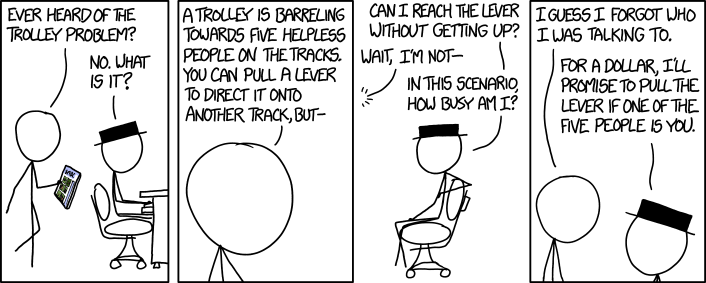Critique of NHTSA's newly released regulations
Submitted by brad on Mon, 2016-09-19 23:58The long awaited list of recommendations and potential regulations for Robocars has just been released by NHTSA, the federal agency that regulates car safety and safety issues in car manufacture. Normally, NHTSA does not regulate car technology before it is released into the market, and the agency, while it says it is wary of slowing down this safety-increasing technology, has decided to do the unprecedented -- and at a whopping 115 pages.





 Here are some basic models of cost. I compare a low-cost 1-2 person robotaxi, a higher-end 1-2 person robotaxi, a 4-person traditional sedan robotaxi and the costs of ownership for a private car, the Toyota Prius 2, as
Here are some basic models of cost. I compare a low-cost 1-2 person robotaxi, a higher-end 1-2 person robotaxi, a 4-person traditional sedan robotaxi and the costs of ownership for a private car, the Toyota Prius 2, as  In other Uber news, Uber has announced it will sell randomly assigned Uber rides in their self-driving vehicles in Pittsburgh. If your ride request is picked at random (and because it's in the right place) Uber will send one of their own cars to drive you on your ride, and will make the ride free, to boot. Of course, there will be an Uber safety driver in the vehicle monitoring it and ready to take over in any problem or complex situation. So the rides are a gimmick to some extent, but if they were not free, it would be a sign of another way to get customers to pay for the cost of testing and verifying self-driving cars. The free rides, however, will probably actually cause more people to take Uber rides hoping they will win the lottery and get not simply the free ride but the self-driving ride.
In other Uber news, Uber has announced it will sell randomly assigned Uber rides in their self-driving vehicles in Pittsburgh. If your ride request is picked at random (and because it's in the right place) Uber will send one of their own cars to drive you on your ride, and will make the ride free, to boot. Of course, there will be an Uber safety driver in the vehicle monitoring it and ready to take over in any problem or complex situation. So the rides are a gimmick to some extent, but if they were not free, it would be a sign of another way to get customers to pay for the cost of testing and verifying self-driving cars. The free rides, however, will probably actually cause more people to take Uber rides hoping they will win the lottery and get not simply the free ride but the self-driving ride. The same is true for trucks, but both trucks and buses have huge power needs which presents problems for having them be electric. Electric's biggest problem here is the long recharge time, which puts your valuable asset out of service. For trucks, the big win of having a robotruck is that it can drive 24 hours/day, you don't want to take that away by making it electric. This means you want to look into things like battery swap, or perhaps more simply tractor swap. In that case, a truck would pull in to a charging station and disconnect from its trailer, and another tractor that just recharged would grab on and keep it going.
The same is true for trucks, but both trucks and buses have huge power needs which presents problems for having them be electric. Electric's biggest problem here is the long recharge time, which puts your valuable asset out of service. For trucks, the big win of having a robotruck is that it can drive 24 hours/day, you don't want to take that away by making it electric. This means you want to look into things like battery swap, or perhaps more simply tractor swap. In that case, a truck would pull in to a charging station and disconnect from its trailer, and another tractor that just recharged would grab on and keep it going.
 Most importantly, it is far from complete. There is tons of stuff it's not able to handle. Some of those things it can't do are known, some are unknown. Because of this, it is designed to only work under constant supervision by a driver. Tesla drivers get this explained in detail in their manual and when they turn on the autopilot.
Most importantly, it is far from complete. There is tons of stuff it's not able to handle. Some of those things it can't do are known, some are unknown. Because of this, it is designed to only work under constant supervision by a driver. Tesla drivers get this explained in detail in their manual and when they turn on the autopilot.
 What does it look like?
What does it look like?

